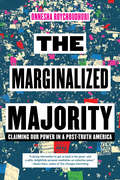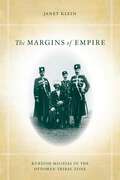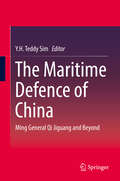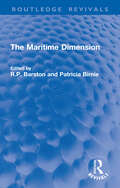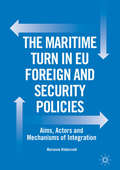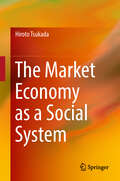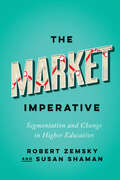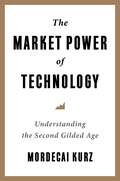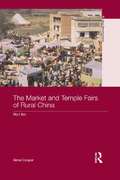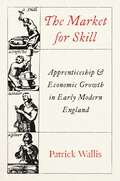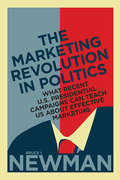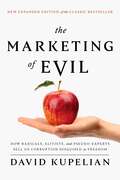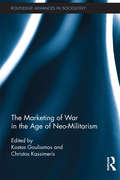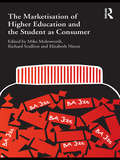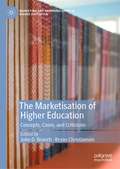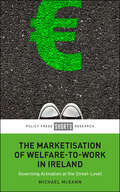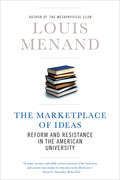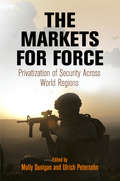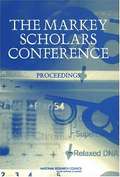- Table View
- List View
The Marginalized Majority: Claiming Our Power in a Post-Truth America
by Onnesha Roychoudhuri“This book is a daring intervention to get us back in the game—and a witty, delightfully personal meditation on collective power.” —Naomi Klein, author of No Is Not Enough and This Changes EverythingEver since the 2016 election, pundits have been saying our country has never been more divided—that if progressives want to reclaim power, we need to be “pragmatic,” reach across the aisle, and look past identity politics. But what if we’re getting the story all wrong? In The Marginalized Majority, Onnesha Roychoudhuri makes the galvanizing case that our voices are already the majority—and that our plurality of identities is not only our greatest strength, but is also at the indisputable core of successful progressive change throughout history. From the Civil Rights Movement to the Women’s March, Saturday Night Live to the mainstream media, Roychoudhuri holds the myths about our disenfranchisement up to the light, illuminating narratives from history that reveal we have far more power than we’re often led to believe. With both clear-eyed hope and electrifying power, she examines our ideas about what’s possible, and what’s necessary—opening up space for action, new realities, and, ultimately, survival. Now, Roychoudhuri urges us, is the time to fight like the majority we already are.
The Margins of Empire
by Janet KleinAt the turn of the twentieth century, the Ottoman state identified multiple threats in its eastern regions. In an attempt to control remote Kurdish populations, Ottoman authorities organized them into a tribal militia and gave them the task of subduing a perceived Armenian threat. Following the story of this militia, Klein explores the contradictory logic of how states incorporate groups they ultimately aim to suppress and how groups who seek autonomy from the state often attempt to do so through state channels. In the end, Armenian revolutionaries were not suppressed and Kurdish leaders, whose authority the state sought to diminish, were empowered. The tribal militia left a lasting impact on the region and on state-society and Kurdish-Turkish relations. Putting a human face on Ottoman-Kurdish histories while also addressing issues of state-building, local power dynamics, violence, and dispossession, this book engages vividly in the study of the paradoxes inherent in modern statecraft.
The Margot Affair
by Sanaë LemoineA New York Times Editor's Choice A Herald's Best Summer Book'An unusual and accomplished first novel . . . moves in intriguing leaps and twists.' Economist'Gorgeous' New York Times'Grapples with the complexity of familial love.' Marie ClaireFrench teenager Margot is the illegitimate daughter of a prominent stage actress and an influential politician. The comings and goings of their unconventional family, in a small Parisian apartment, cast her whole life under a veil of secrecy and shame.One summer, Margot decides to exercise her own agency when she meets a well-regarded journalist whose trust seems surprisingly easy to gain. But as Margot is drawn into an adult world, she learns how one impulsive decision can change the contours of her life, and the lives of those around her, in ways she could never have imagined. In this simmering debut Sanaë Lemoine explores private and public faces, truth and deceit, love and persuasion. The Margot Affair is a novel about the bone-deep bond between mothers and daughters, the devotion and betrayal of friendship and the dangers of pushing beyond the boundaries of a life lived in the shadows.
The Mario Garcia Omnibus E-book
by Mario T. GarcíaThis Omnibus E-Book brings together Mario Garcia's landmark books on Latino Studies. The Latino Generation: Voices of the New AmericaLatinos are already the largest minority group in the United States, and experts estimate that by 2050, one out of three Americans will identify themselves as Latino. Though their population and influence are steadily rising, stereotypes and misconceptions about Latinos remain, from the assumption that they refuse to learn English to questions of just how "American" they actually are. By presenting thirteen riveting oral histories of young, first-generation college students, Mario T. Garcia counters those long-held stereotypes and expands our understanding of what he terms "the Latino Generation."Blowout!: Sal Castro and the Chicano Struggle for Educational JusticeThis fascinating oral history transcribed and presented in Castro's voice by historian Mario T. Garcia, is a compelling, highly readable narrative of Castro, a young boy growing up in Los Angeles who made history by his leadership in the blowouts and in his career as a dedicated and committed teacher.
The Maritime Defence of China: Ming General Qi Jiguang and Beyond
by Y.H. Teddy SimThis edited volume explores the larger maritime and security environment during and beyond the time of Chinese military general Qi Jiguang’s enterprise. While serving as a historiography and biography of Qi Jiguang, the book also elaborates on the doctrinal applications of his ideas. Essays in this volume contribute to the field of China studies in light of the increased frequency of news relating to the maritime and military affairs in the region in the post-2000 period. It provides a specialist perspective to the uneven study of Qi Jiguang and maritime/military studies, while also satisfying the desire of the layman to understand the current political security situation in East Asia in the context of the longer term historical developments.
The Maritime Dimension (Routledge Revivals)
by R. P. Barston Patricia BirnieFor land-locked and coastal states alike, the maritime dimension of national interests has increased dramatically in importance in recent years. Pressure on food and energy resources have coincided with an increase in the global population and insatiable demands for fish and minerals. Maritime conflict remains an ever-present possibility. Originally published in 1980, this book brings together in a single volume expert contributions on the central issues and areas of concern: The offshore exploration of oil and gas, fisheries, world shipping, the exploitation of deep seabed resources, marine pollution and contemporary maritime legal problems. The book outlines the problems, identifies conflicts and examines the variety of methods used by states to resolve them, including national and international laws and organisations, bilaterial and multilateral diplomacy and the increasing use of regional bodies. The Maritime Dimension will be of use to students and policy-makers in international law, environmental and energy studies and international relations.
The Maritime Dimension of European Security
by Basil GermondIn an age of uncertainties influenced by information technologies and the networking of societies, the maritime domain remains the main global lane of communication, vital for trade and security. The European Union has become a maritime actor, carrying out counter-piracy and maritime capacity-building operations and actively dealing with maritime safety, fisheries protection, port security, maritime surveillance and counter-immigration at sea. The Union's policies, mechanisms and activities related to the maritime domain are now backed by a Maritime Security Strategy, adopted by the Council in June 2014. This cutting edge book accounts for the trends in maritime strategy and seapower politics as well as the recent developments in the field, both at the conceptual and practical level. It discusses the significance of the maritime domain for European security in general and for the EU in particular. Readers are provided with the necessary tools to critically assess the EU's potential as a global maritime actor and evaluate why Europe's prosperity and security rests on its capacity to shape events at sea.
The Maritime Dimension of International Security: Terrorism, Piracy, and Challenges for the United States
by Peter ChalkThe vast size and highly unregulated nature of the world's waterways have made the maritime environment an increasingly attractive theater for perpetrators of transnational violence. Piracy and sea-borne terrorism have been on the rise since 2000. While the United States has spearheaded several important initiatives to improve maritime security, the author urges policymakers to consider four additional measures to safeguard the world's oceans.
The Maritime Turn in EU Foreign and Security Policies
by Marianne RiddervoldThis book provides the first substantial treatment of the maritime foreign and security policies of the European Union. Its findings add to the literature by a comparative, theoretically informed analysis of EU maritime foreign and security policies across five cases: the EU's Maritime Security Strategy and action plan; the EU's two naval missions, Atalanta and Sophia; EU Arctic policies, and; EU policies towards the Maritime Labour Convention. Focusing on the aims, actors and mechanisms of integration in these cases, the book speaks to the three main debates in the literature on EU foreign policy, including whether it has a particular normative dimension that makes it different from foreign policy as it is conventionally understood; the extent to which policy-making in the domain has developed beyond intergovernmental cooperation and, interlinked; how EU foreign and security policy integration and its characteristics can be explained. In doing this, the book also addresses a fourth contemporary scholarly debate linked to if and how the EU is affected by crisis. By focusing on maritime security policies the book also adds to the international relations literature more broadly. This book is an invaluable resource for scholars, students and practitioners interested in EU foreign and security policy, European and global maritime security issues, EU integration, EU crisis and international relations. Marianne Riddervold is an Associate Professor at Inland Norway University of applied sciences, a Senior fellow at UC Berkeley Institute of European Studies and a Guest Researcher at ARENA - Centre for European Studies at the University of Oslo.
The Mark of the Horse Lord
by Rosemary SutcliffBearing an uncanny resemblance to the now blind displaced King of the Scots, former gladiator and slave Phaedrus impersonates the Horse Lord to regain control of the Scottish kingdom from the Picts.
The Market Economy as a Social System
by Hiroto TsukadaThis book develops John Rawls’s theory of justice by adding reality-based analyses. This is accomplished by answering the question of who makes rules and how, and by providing new answers to three of today’s most practical and critical issues. The question of who and how makes rules is discussed first; and group orientation instead of individualism, and a balance of negotiating power instead of a veil of ignorance are presented as new answers to this question. Based on this new understanding of rulemaking, three important practical rules are subsequently discussed: the rule of distribution of land and other natural resources, including the question of natural talent or who should bear the costs of children’s education; the rule of distribution of products; and what motives support our acts of kindness. These rules are all dealt with from a shared perspective, viewing society as a single integrated construct. Equal distribution of land, not private but public payment of education fees, strengthening employees’ bargaining power, and moving toward nobility-based kindness are put forward as central answers. By addressing critical questions on social rules and proposing answers, this book provides reliable principles to fall back on in our daily lives, and in our rapidly changing, globalized world.
The Market Imperative: Segmentation and Change in Higher Education (Reforming Higher Education: Innovation and the Public Good)
by Robert Zemsky Susan ShamanThinking about American higher education as an economic market changes everything.It is no surprise that college tuition and student debt are on the rise. Universities no longer charge tuition to simply cover costs. They are market enterprises that charge whatever the market will bear. Institutional ambition, along with increasing competition for students, now shape the economics of higher education.In The Market Imperative, Robert Zemsky and Susan Shaman argue that too many institutional leaders and policy makers do not understand how deeply the consumer markets they promoted have changed American higher education. Instead of functioning as a single integrated industry, higher education is in fact a collection of segmented and more or less separate markets. These markets have their own distinctive operating constraints and logics, especially regarding price. But those most responsible for federal higher education policy have made a muck of the enterprise, while state policy making has all but disappeared, the victim of weak imaginations, insufficient funding, and an aversion to targeted investment. Chapter by chapter, this compelling text draws on new data developed by the authors in a Gates Foundation–funded project to describe the landscape: how the market for higher education distributes students among competing institutions; what the job market is looking for; how markets differ across the fifty states; and how the higher education market determines the kinds of faculty at different kinds of institutions. The volume concludes with a three-pronged set of policies for making American higher education mission centered as well as market smart. Although there is no "one-size-fits-all" approach for reforming higher education, this clearly written book will productively advance understanding of the challenges colleges and universities face by providing a mapping of the configuration of the market for an undergraduate education.
The Market Power of Technology: Understanding the Second Gilded Age
by Mordecai KurzSince the 1980s, the United States has regressed to a level of economic inequality not seen since the Gilded Age in the late nineteenth century. At the same time, technological innovation has transformed society, and a core priority of public policy has been promoting innovation. What is the relationship between economic inequality and technological change?Mordecai Kurz develops a comprehensive integrated theory of the dynamics of market power and income inequality. He shows that technological innovations are not simply sources of growth and progress: they sow the seeds of market power. In a free market economy with intellectual property rights, firms’ control over technology enables them to expand, attain monopoly power, and earn exorbitant profits. Competition among innovators does not eliminate market power because technological competition is different from standard competition; it results in only one or two winners. Kurz provides a pioneering analysis grounded on quantifying technological market power and its effects on inequality, innovation, and economic growth. He outlines what causes market power to rise and fall and details its macroeconomic and distributional consequences.Kurz demonstrates that technological market power tends to rise, increasing inequality of income and wealth. Unchecked inequality threatens the foundations of democracy: public policy is the only counterbalancing force that can restrain corporate power, attain more egalitarian distribution of wealth, and make democracy compatible with capitalism. Presenting a new paradigm for understanding today’s vast inequalities, this book offers detailed proposals to redress them by restricting corporate mergers and acquisitions, reforming patent law, improving the balance of power in the labor market, increasing taxation, promoting upward mobility, and stabilizing the middle class.
The Market and Temple Fairs of Rural China: Red Fire (Asia's Transformations)
by Gene CooperDuring the early communist period of the 1950s, temple fairs in China were both suppressed and secularized. Temples were closed down by the secular regime and their activities classified as feudal superstition and this process only intensified during the Cultural Revolution when even the surviving secular fairs, devoted exclusively to trade with no religious content of any kind, were suppressed. However, once China embarked on its path of free market reform and openness, secular commodity exchange fairs were again authorized, and sometimes encouraged in the name of political economy as a means of stimulating rural commodity circulation and commerce. This book reveals how once these secular "temple-less temple fairs" were in place, they came to serve not only as venues for the proliferation of a great variety of popular cultural performance genres, but also as sites where a revival or recycling of popular religious symbols, already underway in many parts of China, found familiar and fertile ground in which to spread. Taking this shift in the Chinese state’s attitudes and policy towards temple fairs as its starting point, The Market and Temple Fairs of Rural China shows how state-led economic reforms in the early 1980s created a revival in secular commodity exchange fairs, which were granted both the geographic and metaphoric space to function. In turn, this book presents a comprehensive analysis of the temple fair phenomenon, examining its economic, popular cultural, popular religious and political dimensions and demonstrates the multifaceted significance of the fairs which have played a crucial role in expanding the boundaries of contemporary acceptable popular discourse and expression. Based upon extensive fieldwork, this unique book will be of great interest to students and scholars of Chinese religion, Chinese culture, Chinese history and anthropology.
The Market for Skill: Apprenticeship and Economic Growth in Early Modern England
by Patrick WallisHow apprenticeship shaped the English economy Apprenticeship dominated training and skill formation in early modern Europe. Years spent learning from a skilled master were a nearly universal experience for young workers in crafts and trade. In England, when apprenticeship reached its peak, as many as a third of all teenage males would serve and learn as apprentices. In The Market for Skill, Patrick Wallis shows how apprenticeship helped reshape the English economy.Some historians see apprenticeship as a key ingredient in the industrial revolution; others agree with Adam Smith in seeing it as wasteful and conservative. Wallis shows that neither of these perspectives is entirely accurate. He offers a new account of apprenticeship and the market for skill in England, analyzing the records of hundreds of thousands of individual apprentices to tell the story of how apprenticeship worked and how it contributed to the transformation of England. Wallis details the activities of apprentices and masters, the strategies of ambitious parents, the interventions of guilds and the decisions of town officials. He shows how the system of early modern apprenticeship contributed to the growth of cities, the movement of workers from farms to manufacturing and the spread of new technologies and productive knowledge.In this groundbreaking study, Wallis argues that apprenticeship succeeded precisely because it was a flexible institution which allowed apprentices to change their minds and exit contracts early. Apprenticeship provided a vital channel for training that families could trust and that was accessible to most young people, whatever their background.
The Marketing Revolution in Politics
by Bruce I. NewmanIn 2008, Barack Obama's presidential campaign used an innovative combination of social media, big data, and micro-targeting to win the White House. In 2012, the campaign did it again, further honing those marketing tools and demonstrating that political marketing is on the cutting edge when it comes to effective branding, advertising, and relationship-building.The challenges facing a presidential campaign may be unique to the political arena, but the creative solutions are not. The Marketing Revolution in Politics shows how recent US presidential campaigns have adopted the latest marketing techniques and how organizations in the for-profit and non-profit sectors can benefit from their example. Distilling the marketing practices of successful political campaigns down into seven key lessons, Bruce I. Newman shows how organizations of any size can apply the same innovative, creative, and cost-effective marketing tactics as today's presidential hopefuls.A compelling study of marketing in the make-or-break world of American politics, this book should be a must-read for managers, students of marketing and political marketing, and anyone interested in learning more about how presidential campaigns operate.
The Marketing of Evil: How Radicals, Elitists, and Pseudo-Experts Sell Us Corruption Disguised As Freedom
by David KupelianMillions of Americans today embrace ideas and behaviors that would have horrified all previous generations. Why?Why have thousands of years of Judeo-Christian moral standards – the very foundation of Western Civilization – been demonized and criminalized? Why are America's families disintegrating and her schools and colleges poisoning the minds of our youth? Why is our culture becoming ever more bizarre, corrupt, degraded and deranged? Why are 3,000 innocent American children aborted daily? In this widely acclaimed exposé, veteran journalist David Kupelian reveals the brilliant marketing strategies that have turned America upside down: "Within the space of our lifetime, much of what Americans once almost universally abhorred has been packaged, perfumed, gift-wrapped, and sold to us as though it had great value. By skillfully playing on our deeply felt national values of fairness, generosity, and tolerance, these marketers have persuaded us to embrace as enlightened and noble that which every other generation has regarded as grossly self-destructive? In a word, evil." Now, in a new and expanded edition of his culture-war classic, David Kupelian continues to expose the ever-more audacious marketing campaigns and grand deceptions that threaten the very future of America. NEW EXPANDED EDITION OF THE CLASSIC BESTSELLER! "David Kupelian is one of the most thought-provoking and iconoclastic writers I know." — SEAN HANNITY "Every parent in America needs to read this book. David Kupelian skillfully exposes the secular Left's rotten-apple peddlers in devastating detail." — MICHELLE MALKIN "If you really want to understand the adversary's thinking and help turn the tide of battle, read this book!" — DAVID LIMBAUGH
The Marketing of War in the Age of Neo-Militarism (Routledge Advances in Sociology)
by Christos Kassimeris Kostas GouliamosThe post-9/11 era and the overall impact of international terrorism have generated much debate regarding the role of military apparatus in modern society. This book assesses the inherent meaning of the militarization from a critical, interdisciplinary perspective. Against the background of democracy and capitalism, The Marketing of War in the Age of Neo-Militarism challenges prevailing accounts of the "military-industrial complex" as it explores significant interrelated themes denoting the accelerating process of militarization of society. Designed to address pressing socio-political phenomena, this book is the first of its genre contesting conventional wisdom about the perceived link between war and the "military-industrial complex." It is unique not merely because of its approach, but also for its thorough analysis of deeply affected social institutions and processes such as education, popular culture, geopolitics, military expenditure, space and the environment. Contributing authors advance the discussion by exposing factual information demonstrating the nature and scope of society’s militarization. Their analysis is also broadened to encompass key concepts and diverse aspects of the subject matter that provoke a lively debate. The book offers compelling arguments that will be indispensable to scholars, students, professionals, and policy and decision makers with an interest in social and political sciences as well as in other related fields.
The Marketisation of Higher Education and the Student as Consumer
by Mike MolesworthUntil recently government policy in the UK has encouraged an expansion of Higher Education to increase participation and with an express aim of creating a more educated workforce. This expansion has led to competition between Higher Education institutions, with students increasingly positioned as consumers and institutions working to improve the extent to which they meet ‘consumer demands’. Especially given the latest government funding cuts, the most prevalent outlook in Higher Education today is one of business, forcing institutions to reassess the way they are managed and promoted to ensure maximum efficiency, sales and ‘profits’. Students view the opportunity to gain a degree as a right, and a service which they have paid for, demanding a greater choice and a return on their investment. Changes in higher education have been rapid, and there has been little critical research into the implications. This volume brings together internationally comparative academic perspectives, critical accounts and empirical research to explore fully the issues and experiences of education as a commodity, examining: the international and financial context of marketisation the new purposes of universities the implications of university branding and promotion league tables and student surveys vs. quality of education the higher education market and distance learning students as ‘active consumers’ in the co-creation of value changing student experiences, demands and focus. With contributions from many of the leading names involved in Higher Education including Ron Barnett, Frank Furedi, Lewis Elton, Roger Brown and also Laurie Taylor in his journalistic guise as an academic at the University of Poppleton, this book will be essential reading for many.
The Marketisation of Higher Education: Concepts, Cases, and Criticisms (Marketing and Communication in Higher Education)
by Bryan Christiansen John D. BranchThis edited volume explores the nature, scope, and consequences of the marketisation of higher education. Chapters identify different practices which reflect the marketisation of higher education, and offer various perspectives on the policies and procedures which stimulate and regulate it. The volume takes a holistic approach, following the notion that the marketisation of higher education both drives and is driven by the universities which form the higher education market.
The Marketisation of Welfare-To-Work in Ireland: Governing Activation at the Street-Level
by Michael McGannEPDF and EPUB available Open Access under CC-BY-NC-ND licence This book assesses how the practice of contracting-out public employment services via competitive tendering and Payment-by-Results is transforming welfare-to-work in Ireland. It offers Ireland’s introduction of a welfare-to-work market as a case study that speaks to wider international debates in social and public policy about the role of market governance in intensifying the turn towards more regulatory and conditional welfare models on the ground. It draws on unprecedented access to, and extensive survey and interview research with, frontline employment services staff, combined with in-depth interviews with policy officials, organisational managers and jobseekers participating in activation.
The Marketplace of Ideas: Reform and Resistance in the American University (Issues of Our Time)
by Louis Menand"Crisp and illuminating . . . well worth reading."--Wall Street Journal The publication of The Marketplace of Ideas has precipitated a lively debate about the future of the American university system: what makes it so hard for colleges to decide which subjects are required? Why are so many academics against the concept of interdisciplinary studies? From his position at the heart of academe, Harvard professor Louis Menand thinks he's found the answer. Despite the vast social changes and technological advancements that have revolutionized the society at large, general principles of scholarly organization, curriculum, and philosophy have remained remarkably static. Sparking a long-overdue debate about the future of American education, The Marketplace of Ideas argues that twenty-first-century professors and students are essentially trying to function in a nineteenth-century system, and that the resulting conflict threatens to overshadow the basic pursuit of knowledge and truth.
The Markets for Force
by Ulrich Petersohn Molly DuniganThe Markets for Force examines and compares the markets for private military and security contractors in twelve nations: Argentina, Guatemala, Peru, Ecuador, the United Kingdom, the Czech Republic, Ukraine, Russia, Afghanistan, China, Canada, and the United States. Editors Molly Dunigan and Ulrich Petersohn argue that the global market for force is actually a conglomeration of many types of markets that vary according to local politics and geostrategic context. Each case study investigates the particular characteristics of the region's market, how each market evolved into its current form, and what consequence the privatized market may have for state military force and the provision of public safety. The comparative standpoint sheds light on better-known markets but also those less frequently studied, such as the state-owned and -managed security companies in China, militaries working for private sector extractive industries in Ecuador and Peru, and the ways warlord forces overlap with private security companies in Afghanistan.An invaluable resource for scholars and policymakers alike, The Markets for Force offers both an empirical analysis of variations in private military and security companies across the globe and deeper theoretical knowledge of how such markets develop.Contributors: Olivia Allison, Oldrich Bures, Jennifer Catallo, Molly Dunigan, Scott Fitzsimmons, Maiah Jaskoski, Kristina Mani, Carlos Ortiz, Ulrich Petersohn, Jake Sherman, Christopher Spearin.
The Markey Scholars Conference: Proceedings
by Committee for the Evaluation of the Lucille P. Markey Programs in Biomedical SciencesThis is the second of five reports to emerge from the evaluation of the Markey Trust. As part of this assessment, the NRC hosted a scientific conference for Markey Scholars and Visiting Fellows in Rio Grande, Puerto Rico on June 28-30, 2002. The purpose of the conference was to enable the Scholars and Fellows to share their research experiences, just as they did at the annual Scholars Conferences previously conducted by the Markey Trust. All of the attending Scholars and Fellows submitted abstracts of their poster sessions. Six scholars, along with other experts in the biomedical sciences, made formal presentations. These proceedings consist of shortened versions of the individual presentations and the poster session abstracts.
The Marquis
by Laura AuricchioA major biography of the Marquis de Lafayette, French hero of the American Revolution, who, at age nineteen, volunteered to fight under George Washington; a biography that looks past the storybook hero and selfless champion of righteous causes who cast aside family and fortune to advance the transcendent aims of liberty and justice commemorated in America's towns, streets, parks, and schools named after the French nobleman. Laura Auricchio gives us a rich portrait of the man, fully revealed, a man driven by dreams of glory and felled by tragic, human weaknesses. In The Marquis, we come to understand the personal struggles, social quandaries, and idealistic visions that inspired an orphaned young man to cross an ocean and fight a war that was none of his concern; we see a guileless provincial whose unexpected inheritance allowed him to marry into the highest echelons of the French aristocracy, and become a self-consciously awkward presence at the palace of Versailles. Here is the young Lafayette, removed from the French army as a result of sweeping reforms, trapped in a gilded cage until American emissaries reached Paris seeking support for their revolution. In the American cause, Lafayette, whose only vision had been of martial glory, saw a way to reach his dreams, and seized it with gusto. Americans welcomed him with open arms, and he returned their affection fully. His American éclat was so brilliant and his enthusiasm so great that he quickly became the symbol of the Franco-American alliance that ultimately defeated Great Britain. We see how Lafayette's reputation rose to great heights during the American Revolution but collapsed during the French; that when the Bastille fell on July 14, 1789, Parisians hailed Lafayette as the French Washington and appointed him commander of their National Guard, hoping that he would be able to restore order to a city wracked by starvation and violence. As revolutionaries hurtled in radical directions and staunch monarchists dug in their heels, Lafayette lost control, remaining steadfast in his belief that the French monarchy needed to be reformed but not abolished, and doing everything in his power to prevent an American-style republic from taking root in his native land. Formerly seen as France's heroic figure, Lafayette was now viewed as opportunistic, a dreamer, and a traitor to his nation--and today remains a murky figure in French memory. In America, Lafayette's momentous departure from his homeland for the War of Independence has long been hailed as the start of an extraordinary career to be celebrated for generations. In France, it is often seen as just one of his many misbegotten undertakings. Yet no one has managed to offer a satisfactory answer to the crucial question of why: Why did Americans shower Lafayette with so much acclaim in his own time that he remains a hero today, being named an honorary U.S. citizen in 2002--becoming only the seventh person ever granted this distinction? And why, in contrast, does his memory continue to be denigrated in his own land? Auricchio, drawing on substantial new research conducted in libraries, archives, museums, and private homes in France and the United States, gives us history on a grand scale as she answers these crucial questions, revealing the man and his complex life, and challenging and exploring the complicated myths that have surrounded his name for more than two centuries.From the Hardcover edition.
